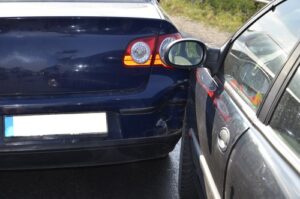
Do you have a case if your airbags do not deploy during a vehicle accident? Yes, you do. If your airbags failed to do their job, then you may pursue legal action against the airbag manufacturer, the car manufacturer, or another liable party.
Seeking legal assistance is crucial to hold the responsible parties accountable and obtain fair compensation when airbag malfunctions exacerbate accident injuries.
An Atlanta car accident lawyer can help you file a claim to recover financial compensation for your injuries, damages, and losses if a defective airbag failed in a crash.
Who Is Liable When Airbags Do Not Deploy During A Car Accident?
After the collision, you’ll need to determine which parties were at fault for both your accident and your injuries. If another driver was negligent, they will be legally responsible for any losses you incurred.
According to the Georgia Code, you can seek damages as compensation for any accident-related injuries. However, if your airbags didn’t deploy and caused you additional injuries, then the vehicle or airbag manufacturer can also be held liable for your damages.
It often takes some research to figure out exactly how to file each claim. But a car accident attorney can look at your case, identify which party or parties are responsible for your losses, and help you seek fair compensation.
Get the strong arm
How Do You Prove Liability after Airbags Do Not Deploy During a Crash?
To bring a case against a manufacturer for airbags that didn’t deploy in a motor vehicle accident, you’ll need to prove the following:
- Your vehicle’s airbags should have deployed in the accident but failed to do so
- The airbags didn’t deploy because they were defective
- As a result of the airbags not deploying, you suffered injuries
- Your injuries from the airbag failure caused damages
Our lawyers can help you examine each of these points, gather evidence to support them, and build a strong case.
When Are Airbags Supposed to Deploy?
Frontal and side airbags should deploy in moderate to severe crashes. Airbags may sometimes deploy during minor collisions, but they are not designed to activate in all crashes. Airbags should work in combination with seat belts to protect you during a crash. They stop your head or upper body from colliding with the inside of your vehicle.
The deployment of an airbag during a collision depends on various factors like:
- How fast the vehicle was going before the crash
- The direction of impact
- The other types of cars involved in the crash
- The location of crash sensors in the vehicle
- The design of your vehicle’s airbag systems
Since these details can vary from accident to accident, you and your lawyer will need to investigate your specific case. In addition, airbags don’t deploy during every type of crash, so you will need to demonstrate that your airbags should have deployed in your crash but didn’t.
What Prevents Airbags from Deploying?
Problems with the vehicle or issues with the airbags themselves can prevent them from inflating during a collision.
Computer Activation Problems
When a vehicle is in a moderate to severe crash, it sends a signal from the airbag system’s electronic control unit that tells the device to inflate. An igniter in the system creates a harmless gas that fills up the airbag quickly.
However, in some cases, electrical components have defects that prevent the airbag from getting the correct signal and inflating.
Defective Crash Sensors
Defects in the sensors that detect a collision prevent the airbag from deploying. This might result from a design defect, poor calibration, or improper installation.
The Airbag Needs Replacing
Airbags should always be replaced after they have deployed during a crash. If that airbag was not replaced, it will not activate during the next collision that occurs.
Other Failures in the Airbag Module
Any other defects or manufacturer issues may lead to problems with airbag deployment. If it’s not immediately clear why the airbag didn’t deploy, your lawyer will likely have a third party examine the vehicle for issues.
Airbags may also not deploy if:
- The vehicle has detected a child or small-stature person in the seat, which may cause the system to shut off
- The crash was moderate, so the car did not detect a need for an airbag inflation
The car or airbag manufacturer may try to say conditions were not suitable for the airbag to deploy. A skilled personal injury lawyer can show how they should have deployed based on the details of your accident.
How Can I Gather Evidence for My Car Accident Case?
To prove that the car or airbag manufacturer was negligent in your accident injuries, you will need to gather information to back up your claim. To show that an airbag should have deployed in your car accident, your lawyer will likely turn to expert testimonies from individuals like medical experts, engineers, or product designers.
Your lawyer may also visit the accident scene and reconstruct the accident to show how it should have produced an airbag deployment.
To help prove negligence and build a strong case, you should also:
- Take pictures of the accident scene, inside your car where the airbag should have gone off, and your injuries
- Obtain witness contact information
- Keep track of all expenses related to your injuries
- Write down everything you remember about the accident
What Type of Injuries Occur When Airbags Do Not Inflate?
According to the National Highway Traffic Safety Administration (NHTSA), airbags can inflate in less than 1/20th of a second. And between 1987 and 2017, airbags saved over 50,000 lives.
When airbags do not deploy during a vehicle crash, passengers can endure severe injuries and losses. You may have a case for compensation when the airbags failed and caused injuries. The most common injuries occur to the:
- Chest: Without an airbag protecting you, you may suffer broken bones and soft tissue damage in your chest.
- Neck and back: If you get thrown forward during a crash, you may suffer from spinal cord damage, whiplash, herniated discs, and other types of strains.
- Arms and legs: During a collision, your ligaments may endure traumatic force that causes fractures or broken bones.
- Internal systems: The force of a vehicle crash can cause internal bleeding or organ damage.
- Face and head: Hitting your head against the inside of your car can lead to concussions, traumatic brain injuries, vision damage, and permanent scarring. A functional frontal airbag should deploy to prevent this.
In addition to medical injuries, an airbag malfunction can also lead to fatalities. If you lost a loved one because an airbag did not inflate during a vehicle crash, you can file a lawsuit with an Atlanta wrongful death lawyer.
What Damages Can You Collect When Airbags Fail to Deploy During a Car Collision?
When faulty airbags fail to deploy, they can cause severe medical problems. A qualified accident attorney can help you receive financial compensation for any accident-related damages you endure. They include:
- Medical expenses for injury treatments
- Future medical costs for ongoing care and rehabilitation
- Pain and suffering
- Lost wages due to missing work from your injuries
- Additional out-of-pocket expenses
Airbags have a duty to protect you and other passengers in your vehicle. So when they fail, you deserve to collect maximum compensation for your medical bills, pain, and injuries.
Our Georgia Car Accident Lawyers Can Handle Your Case
Calling an experienced auto accident lawyer is the best thing you can do after a vehicle collision. You may have a case if your airbags didn’t deploy during your car accident. At John Foy & Associates, we have been helping car accident victims win cases for more than 20 years, and we can help you, too. To discuss the details of your case for free, contact us today.
Our lawyers will work hard to get you every dollar you deserve for your injuries, missed work, and suffering. We’ll stand by your side and not back down until the negligent parties are held fully responsible. You can count on our commitment to your case from start to finish.
(404) 400-4000 or complete a Free Case Evaluation form





